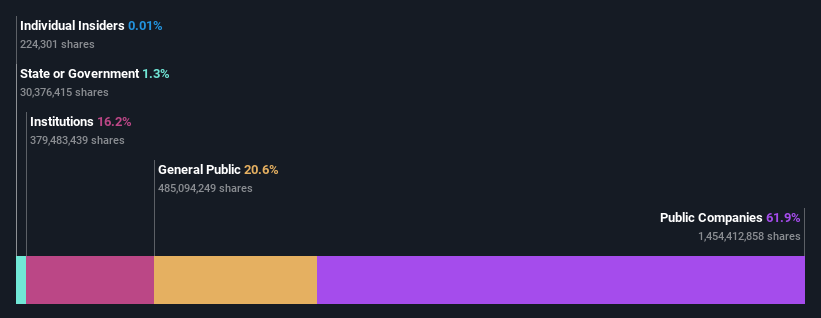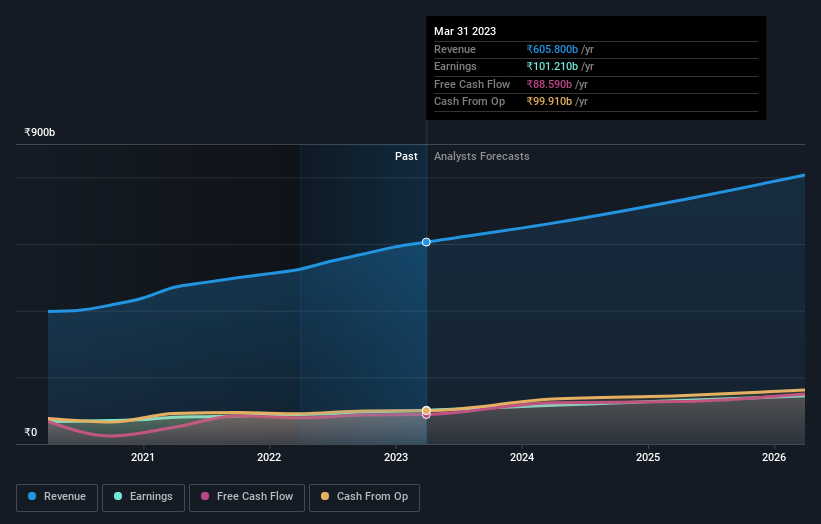- India
- /
- Personal Products
- /
- NSEI:HINDUNILVR
Hindustan Unilever Limited's (NSE:HINDUNILVR) market cap surged ₹327b last week, public companies who have a lot riding on the company were rewarded

Key Insights
- The considerable ownership by public companies in Hindustan Unilever indicates that they collectively have a greater say in management and business strategy
- Unilever PLC owns 62% of the company
- Insiders have been buying lately
A look at the shareholders of Hindustan Unilever Limited (NSE:HINDUNILVR) can tell us which group is most powerful. With 62% stake, public companies possess the maximum shares in the company. Put another way, the group faces the maximum upside potential (or downside risk).
As a result, public companies were the biggest beneficiaries of last week’s 5.5% gain.
Let's delve deeper into each type of owner of Hindustan Unilever, beginning with the chart below.
Check out our latest analysis for Hindustan Unilever

What Does The Institutional Ownership Tell Us About Hindustan Unilever?
Institutions typically measure themselves against a benchmark when reporting to their own investors, so they often become more enthusiastic about a stock once it's included in a major index. We would expect most companies to have some institutions on the register, especially if they are growing.
As you can see, institutional investors have a fair amount of stake in Hindustan Unilever. This implies the analysts working for those institutions have looked at the stock and they like it. But just like anyone else, they could be wrong. If multiple institutions change their view on a stock at the same time, you could see the share price drop fast. It's therefore worth looking at Hindustan Unilever's earnings history below. Of course, the future is what really matters.

Hedge funds don't have many shares in Hindustan Unilever. Looking at our data, we can see that the largest shareholder is Unilever PLC with 62% of shares outstanding. This essentially means that they have extensive influence, if not outright control, over the future of the corporation. With 4.0% and 1.5% of the shares outstanding respectively, Life Insurance Corporation of India, Asset Management Arm and The Vanguard Group, Inc. are the second and third largest shareholders.
While studying institutional ownership for a company can add value to your research, it is also a good practice to research analyst recommendations to get a deeper understand of a stock's expected performance. Quite a few analysts cover the stock, so you could look into forecast growth quite easily.
Insider Ownership Of Hindustan Unilever
The definition of company insiders can be subjective and does vary between jurisdictions. Our data reflects individual insiders, capturing board members at the very least. The company management answer to the board and the latter should represent the interests of shareholders. Notably, sometimes top-level managers are on the board themselves.
Insider ownership is positive when it signals leadership are thinking like the true owners of the company. However, high insider ownership can also give immense power to a small group within the company. This can be negative in some circumstances.
Our most recent data indicates that insiders own less than 1% of Hindustan Unilever Limited. As it is a large company, we'd only expect insiders to own a small percentage of it. But it's worth noting that they own ₹597m worth of shares. It is always good to see at least some insider ownership, but it might be worth checking if those insiders have been selling.
General Public Ownership
The general public, who are usually individual investors, hold a 21% stake in Hindustan Unilever. While this group can't necessarily call the shots, it can certainly have a real influence on how the company is run.
Public Company Ownership
It appears to us that public companies own 62% of Hindustan Unilever. This may be a strategic interest and the two companies may have related business interests. It could be that they have de-merged. This holding is probably worth investigating further.
Next Steps:
I find it very interesting to look at who exactly owns a company. But to truly gain insight, we need to consider other information, too. To that end, you should be aware of the 1 warning sign we've spotted with Hindustan Unilever .
But ultimately it is the future, not the past, that will determine how well the owners of this business will do. Therefore we think it advisable to take a look at this free report showing whether analysts are predicting a brighter future.
NB: Figures in this article are calculated using data from the last twelve months, which refer to the 12-month period ending on the last date of the month the financial statement is dated. This may not be consistent with full year annual report figures.
Valuation is complex, but we're here to simplify it.
Discover if Hindustan Unilever might be undervalued or overvalued with our detailed analysis, featuring fair value estimates, potential risks, dividends, insider trades, and its financial condition.
Access Free AnalysisHave feedback on this article? Concerned about the content? Get in touch with us directly. Alternatively, email editorial-team (at) simplywallst.com.
This article by Simply Wall St is general in nature. We provide commentary based on historical data and analyst forecasts only using an unbiased methodology and our articles are not intended to be financial advice. It does not constitute a recommendation to buy or sell any stock, and does not take account of your objectives, or your financial situation. We aim to bring you long-term focused analysis driven by fundamental data. Note that our analysis may not factor in the latest price-sensitive company announcements or qualitative material. Simply Wall St has no position in any stocks mentioned.
About NSEI:HINDUNILVR
Hindustan Unilever
A fast-moving consumer good company, manufactures and sells food, home care, personal care, and refreshment products in India and internationally.
Excellent balance sheet with proven track record and pays a dividend.
Similar Companies
Market Insights
Community Narratives



